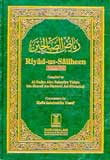Riyad Us-Saliheen (Gardens of the Righteous)

Chapter 271
Prohibition of Spying on Muslims and to be Inquisitive about Others
Allah, the Exalted, says:
"And spy not.'' (49:12)
"And those who annoy believing men and women undeservedly, bear on themselves the crime of slander and plain sin.'' (33:58)
1570. Abu Hurairah (May Allah be pleased with him) said: The Messenger of Allah (PBUH) said, "Beware of suspicion, for suspicion is the worst of false tales. Do not look for other's faults. Do not spy one another, and do not practise Najsh (means to offer a high price for something in order to allure another customer who is interested in the thing). Do not be jealous of one another and do not nurse enmity against one another. Do not sever ties with one another. Become the slaves of Allah, and be brothers to one another as He commanded. A Muslim is the brother of a Muslim. He should neither oppress him nor humiliate him. The piety is here! The piety is here!'' While saying so he pointed towards his chest. "It is enough evil for a Muslim to look down upon his Muslim brother. All things of a Muslim are inviolable for his brother in Faith: his blood, his wealth and his honour. Verily, Allah does not look to your bodies nor to your faces but He looks to your hearts and your deeds.''
Another narration is: "Do not feel envy against one another; do not nurse enmity; do not spy on one another and do not cheat one another. Be Allah's slaves, brethren to one another.''
Another narration is: "Do not have estranged relations with one another. Do not nurse enmity and do not feel envy against one another. O Allah's worshippers! Be brothers!''
Another narration is: "Do not estrange mutual relations and do not intervene into the transaction which is likely to be settled with another person.''
[Muslim].
Commentary: "Beware of suspicion'' means such suspicion about a Muslim for which no apparent evidence is available. Similar is the case of that thought which emerges in one's mind without any logic. "Najsh'' means to give higher bid in auction only to deceive others. Thus, it is a false bid which is not at all intended for purchasing the thing which is being auctioned. The instructions given to the Muslims in this Hadith are meant to secure the honour of Muslims. Since, doubt without any reason, and search for defects and weaknesses go against the security of a Muslim's honour, Islam has strictly forbidden Muslims from them. Another purpose for forbidding such things is to consolidate Muslim brotherhood. For this reason, they have been forbidden from oppression, leaving their Muslim brothers in lurch, considering others humble, and from taking pride in worldly possessions. In fact, the life, property, and honour of a Muslim have been declared unlawful for all other Muslims. Increase in a bid without any intention of buying the thing being auctioned and bargain over a bargain have also been prohibited because they also create ill-will and enmity.
1571. Muawiyah (May Allah be pleased with him) said: I heard the Messenger of Allah (PBUH) saying, "If you find faults with Muslims, you will corrupt them.''
[Abu Dawud].
Commentary: If a Muslim looks for the defects of another and hunts for his weaknesses, other Muslims will also adopt the same attitude towards him, and this situation will create dissension and conflict in society. This also will make them fall prey to sins and make them persistent in committing them. For this reason, spying and finding faults with Muslims has been prohibited by Shari`ah.
1572. It has been reported that a man was brought before Abdullah bin Mas`ud (May Allah be pleased with him) because his beard was giving out smell of wine. Ibn Mas`ud said: "We have been prohibited from spying (on Muslims) and finding faults (with them). But we can take to task only and only if the sin is overt.
[Abu Dawud].
Commentary:
1. In this Hadith we find a model conduct of the Companions of the Prophet (PBUH) which was taught to them by Islam. The Companions of the Prophet (PBUH) were certainly strict followers of the commands and prohibitions of Islam.
2. A Hadd or Ta`zir (punishment) is not enforced on mere suspicion. A solid evidence is essential for both of them.
